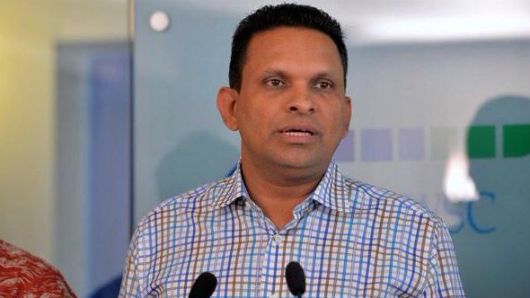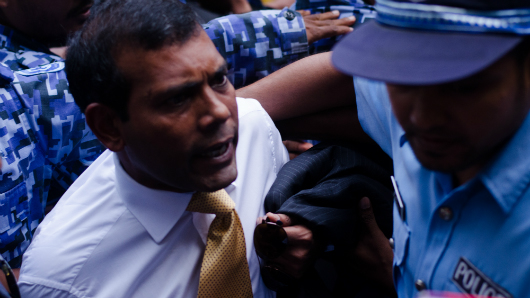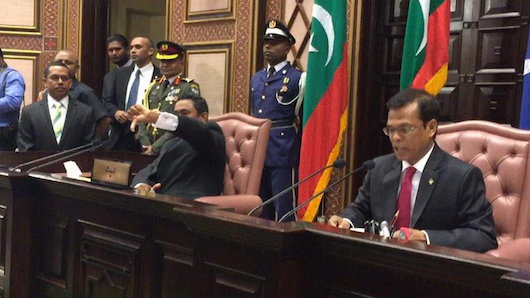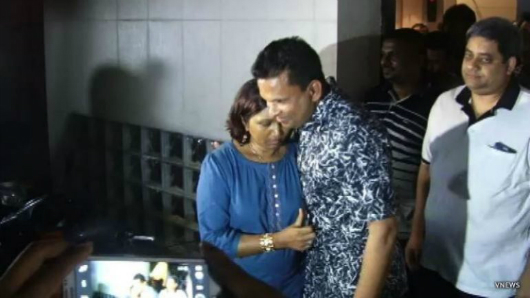Former President Mohamed Nasheed’s ongoing trial on terrorism charges is “not free or fair,” contends NGO Maldivian Democracy Network (MDN), highlighting several irregularities in the hearings at the Criminal Court.
“It is with great desperation that the Maldivian Democracy Network calls upon the higher courts of the Maldives, the Judicial Service Commission, the Human Rights Commission of Maldives, the parliament and the president of the Maldives to acknowledge and restore justice with regard to the trial of former President Mohamed Nasheed,” MDN said in a statement on March 10.
“Furthermore we also call upon the international community, United Nations Special Rapporteur for Judges and Lawyers Gabriela Knaul and United Nations Special Rapporteur for Freedom of Assembly to hold the Maldivian government to account for its continued breach of the constitution, laws and regulations.”
Nasheed is accused of ordering the military to detain Criminal Court Chief Judge Abdulla Mohamed in January 2012. Following international concern and opposition demands to release “political prisoners,” President Abdulla Yameen has said he could not interfere in criminal proceedings as the judiciary was an independent branch of the state under the new constitution.
Irregularities
Listing 11 issues of concern with the trial, the democracy and human rights NGO noted that presiding judges denied Nasheed legal counsel despite repeated requests during the hearing on March 9.
All four of Nasheed’s lawyers had quit in protest of the Criminal Court’s refusal to grant sufficient time to examine the prosecution’s evidence and prepare a defence against new terror charges pressed on February 22.
On February 15, Prosecutor General Muhthaz Muhsin withdrew charges raised against the opposition leader under article 81 of the penal code for illegally detaining a government employee who has not been convicted of a crime. The offence carries a jail term of up to three years.
However, the new charges of “enforced disappearance” filed under anti-terrorism laws carry a jail term or banishment of between 10 to 15 years.
MDN noted that Nasheed’s legal team was given three days for the initial preparation and one day for witness evaluation.
“All attempts by Nasheed’s legal counsel to appeal to the Criminal Court (one appeal) and the High Court (four appeals) have been rejected,” MDN stated.
“Nasheed’s legal counsel was not provided timely meetings with Nasheed in preparation for previous hearings.”
MDN also observed that Judges Abdulla Didi, Abdul Bari Yousuf and Shujau Usman have “engaged in several acts where their integrity has been compromised, such as elaborating and answering for the prosecution and state witnesses during cross examination and open demonstration of animosity towards Nasheed and his legal counsel during hearings.”
State prosecutors have also admitted in court to engaging with witnesses, which MDN argued could be “perceived as witness coaching.”
When Nasheed’s lawyers objected, MDN noted that the presiding judge asked whether it was a problem.
Moreover, the judges blocked and ignored Nasheed lawyers’ attempts to “negate state witnesses” under High Court precedents, MDN said.
The judges also refused to admit or hear defence witnesses, claiming they could not negate the prosecution’s evidence or witness testimony.
Referring to video footage submitted as evidence by the prosecution, MDN noted that two judges presiding over the case were at the scene when Judge Abdulla was taken into military custody.
However, the judges have denied Nasheed’s lawyers’ requests to either recuse themselves from the case or be named defence witnesses.
“The Criminal Court has refused to acknowledge international and local trial observers,” the MDN statement continued.
“The Criminal Court allows six members of the public and 10 media persons to enter the viewing gallery while the same courtroom previously allowed 40 seats for viewing.”
MDN also referred to an incident on Sunday night where Raajje TV journalists were forced to delete footage of PG Muhsin allegedly meeting Judge Bari in a café. The Criminal Court subsequently barred all journalists from the station from observing trials.
MDN stressed that the Maldives was a signatory to the International Covenant of Civil and Political Rights, which obliges the state to afford all citizens a fair trial.
“We call upon the state to make all necessary lawful interventions into these unconstitutional acts and restore law and order in the country,” MDN said.
Related to this story
“This is not a court of law. This is injustice,” Nasheed tells the Criminal Court
Nasheed’s lawyers quit
Nasheed’s lawyers stage no-show citing insufficient time for preparation
State prosecutors influencing witnesses, claim Nasheed’s lawyers
Chief of Defense Forces testifies in Nasheed, Tholhath terrorism trials
Nasheed contests credibility of police and military witnesses in terrorism trial
Judges Didi and Yoosuf refuse to step down from Nasheed’s terrorism trial
Nasheed denies ordering Judge Abdulla arrest, granted three days to answer charges
Former President Nasheed arrives in court with arm in makeshift sling
Nasheed denied right to appoint lawyer and appeal “arbitrary” arrest warrant, contend lawyers




